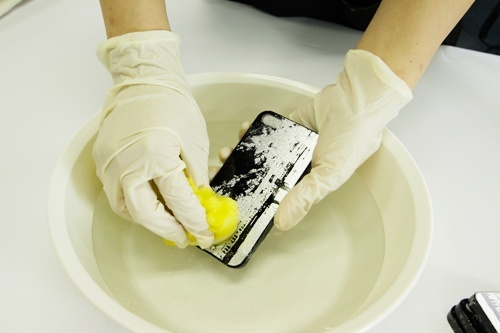Create image data
Two different image data are needed for the digital MAKIE.
Click here to see detailed instructions on how to create duotone print data.
* On this tutorial, photo data is used. Therefore, Photoshop is used for editing the data. If only vector data such as color logo is used, Illustrator is used for data creation or editing.
When creating the data by Illustrator, assign the black to areas to be applied glitters or foils.

Raster Image Processing
Print image file is rasterized by "RasterLink"
A raster image processor (RIP) converts the image data to an appropriate data format for digital inkjet printing.
Mimaki RasterLink is software RIP that can rasterize the data without a special hardware.
In addition, RasterLink has a variety of tools for optimizing the data for inkjet printing.
For more information about RasterLink, please visit here.
Number a jig and a case
To avoid mismatch of color and duotone print results owing to a slight difference in a mounting positions of the jig. Place the case on the same position of the jig through whole print procedures. To identify, assign the same number to the case as the position.
Numbering and positioning are necessary processes for producing high-quality products.

Printing duotone data with primer and white ink
Place the cases on assigned positions and then start printing
Before printing, wipe the surface with a achol swab or cloth to remove fingerprints or dust.
Start print with UJF-3042HG
The white ink is printed first to contrast with black base color, and then the primer is printed.

Necessary tools
No special tool is required.
Tools
・Water-filled basin
・Wiping cloth
・Sponge for cleaning
・Glitters
・Sponge for applying glitters
Gold, silver, pearl and various glitters are sold in the market.


Apply the glitter on the case
Take up glitters onto a sponge and apply it on the case. If the glitters are not applied well, push the sponge on the case.
Note
To prevent fine-grain glitter adhesion on furnitures or clothes, please secure an adequate work space and wear protective gloves and clothes.

Wash excess glitters
Wash the case in the basin after applying sufficient amount of glitters.
Wipe the case well.

Color printing over the glittered case.
After glittering, place the case on the jig and start color printing.
Printed colors on glitters are changed to metallic colors.

Varnish the case with clear ink printing
Print a clear ink for final finish. Print data is the same as used for primer printing.
Clear ink adds protective coating, increases texture and enhances three-dimensional effect.
The finished product surface is very brilliant!
Watch the video below.

Doming finish
Doming: Utilization of liquid resin surface tension
Doming is one of finish technique by utilizing a surface tension of special liquid resin.
Glossy finish and three dimensional effect are obtained when doming resin is used instead of the clear ink.

Click here for more details.
Finish comparison
Note
- The appearance of the finished product may vary depending on conditions and environment such as room temperature. Please test before starting production.
- Content in this website is subject to change without notice.





